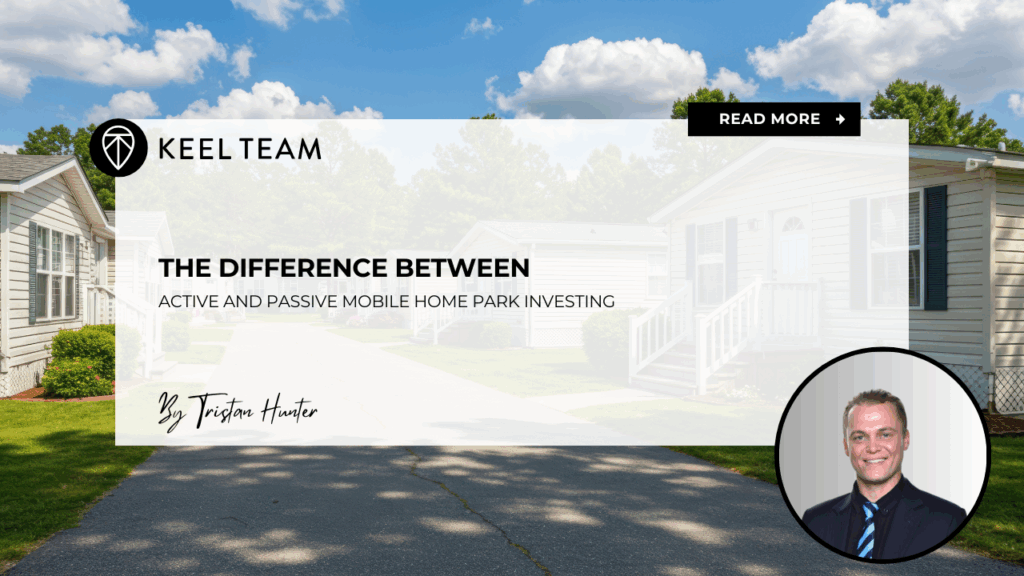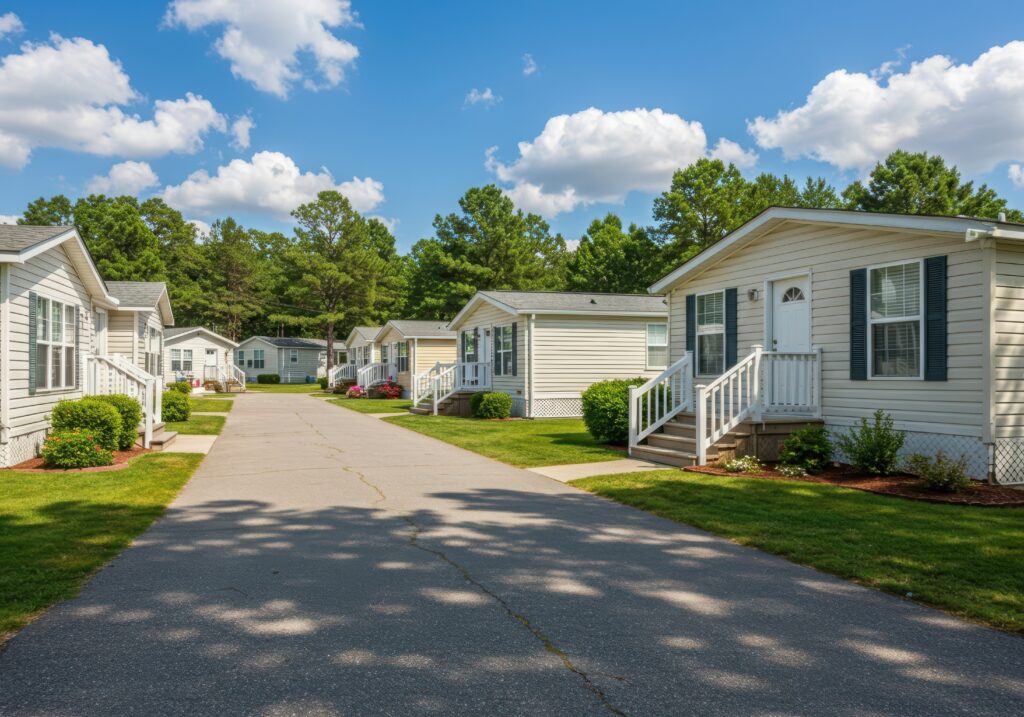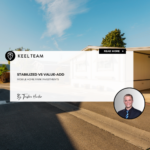The Difference Between Active and Passive Mobile Home Park Investing
-
 Tristan Hunter - Investor Relations
Tristan Hunter - Investor Relations

Investors who look at mobile home park investing often face one of the first big decisions: whether to pursue an active role or take a passive approach. Both strategies can present potential opportunities, but they also come with different levels of responsibility, time commitment, and involvement. Understanding the difference between active and passive mobile home park investing can help investors choose the path that best aligns with their financial goals, lifestyle, and tolerance for risk.
What Is Active Mobile Home Park Investing?
Direct Ownership and Control
Active mobile home park investing typically means owning and operating a community directly. In this case, the investor purchases the mobile home park, takes responsibility for management decisions, and oversees operations.
Key Responsibilities
Active investors often handle tasks such as:
- Managing tenant relationships
- Coordinating maintenance and repairs
- Hiring and supervising property managers
- Handling utilities and infrastructure projects
- Overseeing marketing and rent collections
While some investors outsource day-to-day management to third-party companies, the ultimate responsibility usually rests with the owner.
Time Commitment
Because active investing requires hands-on involvement, it can resemble a full-time business rather than a passive income stream. Investors may spend significant time resolving tenant issues, reviewing financials, and handling unexpected property challenges.
Download our FREE eBook on the Top 20 things to know BEFORE investing in mobile home parks!
What Is Passive Mobile Home Park Investing?
Limited Responsibility and Involvement
Passive mobile home park investing allows individuals to invest in communities without taking on the daily responsibilities of ownership. Typically, this is done through syndications or private offerings led by experienced operators.
In these arrangements, investors contribute capital to acquire and improve mobile home parks while professional managers handle the operations.
How Passive Investors Participate
Passive investors are often limited partners (LPs) in a syndication. Their role is to provide funds in exchange for a share of potential profits. They do not make operational decisions but instead rely on the syndicator or sponsor to execute the business plan.
Lifestyle Advantage
For those who want exposure to the mobile home park asset class but do not wish to manage tenants, contractors, and property issues, passive investing can offer a way to participate without the daily workload.
Comparing Active and Passive Mobile Home Park Investing
Level of Control
- Active investing: Investors make all decisions regarding management, improvements, and finances.
- Passive investing: Investors have no direct control but can benefit from the expertise of professional operators.
Risk Exposure
- Active investors assume full operational and financial risk. If something goes wrong, they must find solutions.
- Passive investors share risk with other investors but rely heavily on the syndicator’s ability to manage the property effectively.
Time Commitment
- Active investors often treat the investment like a small business, requiring substantial time.
- Passive investors typically commit time upfront to vet the sponsor and opportunity, but much less after that.
Return Potential
- Active investors may capture a larger share of potential upside since they take on all responsibilities and risks.
- Passive investors usually accept a smaller share of returns in exchange for reduced involvement.
Download our FREE eBook on the Top 10 things to know BEFORE investing PASSIVELY in mobile home parks!
The Benefits of Active Mobile Home Park Investing
Full Decision-Making Power
Active investors enjoy complete control. They decide when to increase lot rents, which capital improvements to prioritize, and when to refinance or sell the property.
Potential for Greater Upside
Because active investors keep 100% of the equity (unless they partner with others), they may capture more of the financial upside if the property performs well.
Building Direct Experience
Owning and managing a mobile home park can provide valuable real estate experience, which can be leveraged into future investments.
The Challenges of Active Mobile Home Park Investing
Intensive Management Needs
Mobile home parks are unique assets. Infrastructure such as water, sewer, and roads often requires specialized attention. Managing tenant relations in affordable housing communities can also present challenges.
Financial Risks
If occupancy declines or unexpected capital expenditures arise, active investors bear the full burden. Issues like replacing water lines, repairing septic systems, or repaving roads can become expensive projects.
Lifestyle Considerations
Active investing requires time and energy. For those who already have demanding careers or family commitments, balancing direct ownership responsibilities can be challenging.
The Benefits of Passive Mobile Home Park Investing
Reduced Workload
Passive investors typically do not deal with tenants, contractors, or property management headaches. Once the investment is made, the sponsor manages the day-to-day operations.
Access to Professional Operators
Passive investors can benefit from the expertise of seasoned operators who specialize in mobile home park acquisitions and management. This can reduce the learning curve that active investors face.
Diversification Opportunities
Through syndications, investors can diversify across multiple properties or markets without having to manage each one directly.
The Challenges of Passive Mobile Home Park Investing
Less Control
Because sponsors make all operational decisions, passive investors must be comfortable giving up control. They cannot decide when to raise rents, renovate, or sell.
Dependence on the Sponsor
The success of the investment often depends heavily on the sponsor’s competence, integrity, and execution of the business plan.
Limited Liquidity
Like many private real estate investments, passive investments in mobile home parks are often illiquid. Investors may need to commit their capital for several years before realizing returns.

Key Factors to Consider Before Choosing a Strategy
Time Availability
Ask yourself: do you have the time to manage tenants, contractors, and property operations? If not, passive investing may be a better fit.
Risk Tolerance
Would you prefer full control of both risks and rewards, or are you comfortable relying on a sponsor’s experience?
Desired Involvement
Some investors enjoy the hands-on nature of active ownership, while others prefer to stay in the background.
Capital Requirements
Direct ownership often requires significant capital for acquisition and reserves. Passive investments may have lower minimums but still require careful evaluation.
How Investors Can Evaluate Passive Opportunities
When considering a passive investment, investors may want to:
- Research the sponsor’s track record
- Review the private placement memorandum (PPM) carefully
- Ask questions about the business plan, debt structure, and exit strategy
- Understand projected distributions and timelines
- Clarify fees charged by the sponsor
These steps can help investors make informed decisions, though outcomes can never be guaranteed.
Conclusion: Which Path Is Right for You?
The choice between active and passive mobile home park investing depends on personal goals, resources, and lifestyle. Active investors may enjoy full control and potentially greater upside but must commit significant time and take on operational risks. Passive investors, on the other hand, can gain exposure to the asset class while leaving day-to-day responsibilities to professional operators.
There is no one-size-fits-all approach. Both strategies can play a role in building wealth and contributing to the affordable housing sector. The key is to understand the trade-offs and choose the approach that aligns best with your objectives.
Are you looking for MORE information? Book a 1-on-1 consultation with Andrew Keel to discuss:
- A mobile home park deal review
- Due diligence questions
- How to raise capital from investors
- Mistakes to avoid, and more!
Disclaimer:
The information provided is for informational purposes only and is not investment advice or a guarantee of any kind. We do not guarantee profitability. Make investment decisions based on your research and consult registered financial and legal professionals. We are not registered financial or legal professionals and do not provide personalized investment recommendations.

Tristan Hunter - Investor Relations
View The Previous or Next Post
Subscribe Below 👇





